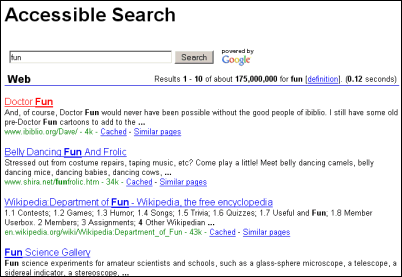Thursday, July 20, 2006
Google Accessible Search

Google released a new product called Accessible Search, a “web search for the visually challenged.” Though result pages are somewhat less cluttered compared to normal Google results, the point here is not so much to create accessible results formatting, but to rank accessible results higher. Google writes:
Google Accessible Search looks at a number of signals by examining the HTML markup found on a web page. It tends to favor pages that degrade gracefully – pages with few visual distractions and pages that are likely to render well with images turned off. Google Accessible Search is built on Google Co-op’s technology, which improves search results based on specialized interests. ...
[W]e take into account several factors, including a given page’s simplicity, how much visual imagery it carries and whether or not it’s (sic) primary purpose is immediately viable with keyboard navigation.
Google adds that adherence to the W3C’s Web Content Accessibility Guidelines is a good way of ensuring accessibility. It’s a bit ironic that Google’s own Accessible Search results don’t conform to W3C practices for accessibility; for example, the WCAG says “use the CSS ’font’ property instead of the HTML FONT element to control font styles,” yet Google uses the deprected font tag in results (which don’t even include a doctype).
Comparing results
I wrote a small tool to compare Accessible Search results to those of Web Search. (You don’t need to go to the Google Labs page, you can also append “&cx=accessible%21” to a normal web search result, which is what I did here.) For example, when you search for fun, the first normal Google result is funbrain.com, and the second is funtrivia.com. The same search with the accessible option activated however doesn’t show either of the two sites in the top 10; instead, ibiblio.org/Dave/ ranks top. And indeed, funbrain.com is more “crowded” and image heavy that the Ibiblio page.
Making accessibility an important part of ranking, even when this is only a Google Labs product so far, is a nice move. I only wonder if Google can get this right? Their own websites aren’t really proof that Google “gets” accessibility, at least not when you apply the guidelines put forth by the World Wide Web Consortium.
[Thanks Corsin Camichel!]
>> More posts
Advertisement
This site unofficially covers Google™ and more with some rights reserved. Join our forum!
